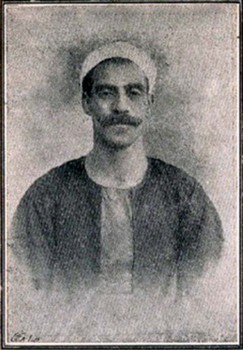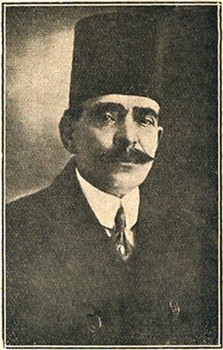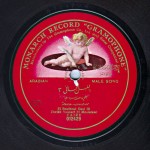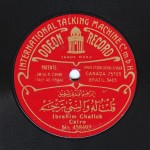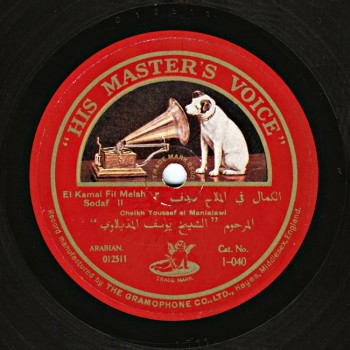 The Arab Music Archiving and Research foundation (AMAR), in collaboration with the Sharjah Art Foundation (SAF), presents “Min al-Tārīkh”.
The Arab Music Archiving and Research foundation (AMAR), in collaboration with the Sharjah Art Foundation (SAF), presents “Min al-Tārīkh”.
Dear listeners, welcome to a new episode of “Min al-Tārīkh”.
In today’s episode, we will resume our discussion about Ibrāhīm al-Qabbānī with Prof. Frédéric Lagrange.
What is the ḥijāz kār kurd’s structure? We have talked about the bastanikār, but not about the ḥijāz kār kurd.
Let us talk about the ḥijāz kār kurd…
Again, each tried his luck in composing a dawr to the ḥijāz kār kurd, whether a pure ḥijāz kār kurd, a maqām close to the ḥijāz kār kurd, a modernized ḥijāz kār kurd, or –as in your opinion– a ḥijāz kār kurd as misunderstood by Dāwūd Ḥusnī.
We will discuss this in our episode on Dāwūd Ḥusnī.
Ibrāhīm al-Qabbānī’s ḥijāz kār kurd is a pure ḥijāz kār kurd. And, strangely, he imitated his kinsman Muḥammad ‘Abd al-Raḥīm al-Maslūb and composed a dawr to the aqṣāq.
He imitated him as to the use of the aqṣāq, i.e. a rhythm other than the maṣmūdī, in dawr “Anā fu’ādī yōm ‘ishi’ ”
We have previously discussed Al-Maslūb’s dawr “Fī zamān el-waṣl” composed to a 9-pulse’ rhythm. This is a 9-pulse’ rhythm too… so it is probably an extension of Al-Maslūb.
The very rich and beautiful dawr was recorded on 3 record-sides. It is fully to the aqṣāq –the henk and the waḥāyid are also to the aqṣāq. Sayyid al-Ṣaftī recorded it, as well as Ibrāhīm al-Qabbānī according to some. We have a broken disc of the last record-side of the dawr. Unfortunately, the disc was a trial disc and was not published, and is thus quasi-impossible to find. But who knows what the future has in store for us.
Let us listen to this dawr performed by Sayyid al-Ṣaftī…
(♩)
Let us talk about Sayyid Darwīsh and the famous issue of “Intaha el-hals fī el-balad” (the country is now free of moral decay).
Sources claim –truly or falsely– that after the death of Sayyid Darwīsh, Al-Qabbānī said at the Oriental Music Institute “Intaha el-hals fī el-balad”, an accusation repeated by his son.
What do you think? What can we understand from this saying attributed to him? …“Intaha el-hals fī el-balad”.
Let us first analyse the meaning of the terms. Does this sentence imply that Sayyid Darwīsh was a symbol of the lack of artistic morality in Egypt when he died in 1923? That he composed the so-called depraved ṭaqṭūqa? That he was responsible for the path taken by the Egyptian music since the 1920’s, i.e. the “westernized” forms and structures, the musical language itself, as well as the tendency towards the singing theatre that Al-Qabbānī seemingly refused. This is one hypothesis.
Was this about the lifestyle of musicians and the musical milieu? …But there was no difference between their lifestyle in the late 19th century and in the 20th…
On the other hand, this saying could be a fraud, an accusation addressed to Al-Qabbānī and not to Sayyid Darwīsh: when the latter became an icon of nationalistic Egyptian music, the symbols of the musical tendencies that went against his new tendencies, and which he represented, had to be destroyed. Consequently, Dāwūd Ḥusnī and Ibrāhīm al-Qabbānī had to be dispraised. So, such sayings were fabricated, especially by those who defended the nationalistic movement in Egypt that affected music.
I agree with the third opinion for many reasons:
First, if Al-Qabbānī considered Sayyid Darwīsh as a symbol of moral decay, would this moral decay end with the death of the symbol? Al-Qabbānī was 70 years’ old, and I think he was wise enough to self analyse. Then, where was this moral decay when we consider Bahiyya al-Maḥallawiyya’s songs recorded in the early 20th century? i.e. 15 years before Sayyid Darwīsh. Was the moral decay limited to Sayyid Darwīsh? Most of Muḥammad ‘Alī Li‘ba’s, ‘Abd al-Laṭīf al-Bannā’s, and Munīra al-Mahdiyya’s ṭaqṭūqa were not composed by Sayyid Darwīsh, but young composers.
Moreover, those farthest from morality were the lyrics of the songs of ‘ālima authored before the discs’ era.
Consequently, I do not believe this saying. Not because he liked Sayyid Darwīsh –whether he liked or disliked him is not the point. These are personal matters–, but because it is not logical. To him, moral decay had neither started with Sayyid Darwīsh nor ended with his death. On the contrary, I think he had a different point of view, demonstrated in his opinion about Zakī Murād, etc. He thought that moral decay, even musical moral decay, had started, not ended, during this period… I do not believe this saying.
Did he mean “moral decay” in music aesthetics? –If there is an aesthetic meaning to the expression “moral decay”–, or did he imply the moral decay in social behaviours?
In both cases, moral decay had not ended. I think all they wanted to convey is that Ibrāhīm al-Qabbānī hated Sayyid Darwīsh, that old music hated new music.
Exactly. I think this was only meant to define the major aesthetic struggle that started in the 1920’s as a struggle between the old and the new.
Mister Mustafa, I would like to ask you a question: do you think that the lyrics of “Amr al-maḥabba” are morally acceptable, or not?
Morally acceptable indeed! They do not appear in any of the dawr recordings!
I think that “El-kamāl fī el-milāḥ ṣudaf” will be the perfect conclusion to this episode.
The perfect conclusion indeed.
I do not know why I have a preference for this dawr. It is at once rich and light, long yet excluding any lengthiness, one does not feel that it is long.
Sheikh Yūsuf recorded it on 4 rich sides that do not include anything incomplete, and no lengthiness.
Shall we end our episode with this dawr performed by Sheikh Yūsuf?
We thank Prof. Frédéric Lagrange and we will meet again in a new episode of “Min al-Tārīkh”.
Now let us listen to Sheikh Yūsuf al-Manyalāwī…
…singing “El-kamāl fī el-milāḥ ṣudaf”
(♩)
“Min al-Tārīkh” is brought to you by Mustafa Said.
- 221 – Zakariyya Ahmed – 12 (1/9/2022)
- 220 – Zakariyya Ahmed – 11 (1/9/2022)
- 219 – Zakariyya Ahmed – 10 (11/25/2021)
- 218 – Zakariyya Ahmed – 9 (10/26/2021)
- 217 – Zakariyya Ahmed – 8 (9/24/2021)
- 216 – Zakariyya Ahmed – 7 (9/4/2021)
- 215 – Zakariyya Ahmed – 6 (8/28/2021)
- 214 – Zakariyya Ahmed – 5 (8/6/2021)
- 213 – Zakariyya Ahmed – 4 (6/26/2021)
- 212 – Zakariyya Ahmed – 3 (5/27/2021)
- 211 – Zakariyya Ahmed – 2 (5/1/2021)
- 210 – Zakariyya Ahmed – 1 (4/28/2021)
- 209 – W-al-Lāhi lā astaṭī‘u ṣaddak 2 (4/6/2017)
- 208 – W-al-Lāhi lā astaṭī‘u ṣaddak 1 (3/30/2017)
- 207 – Bashraf qarah baṭāq 7 (3/23/2017)

